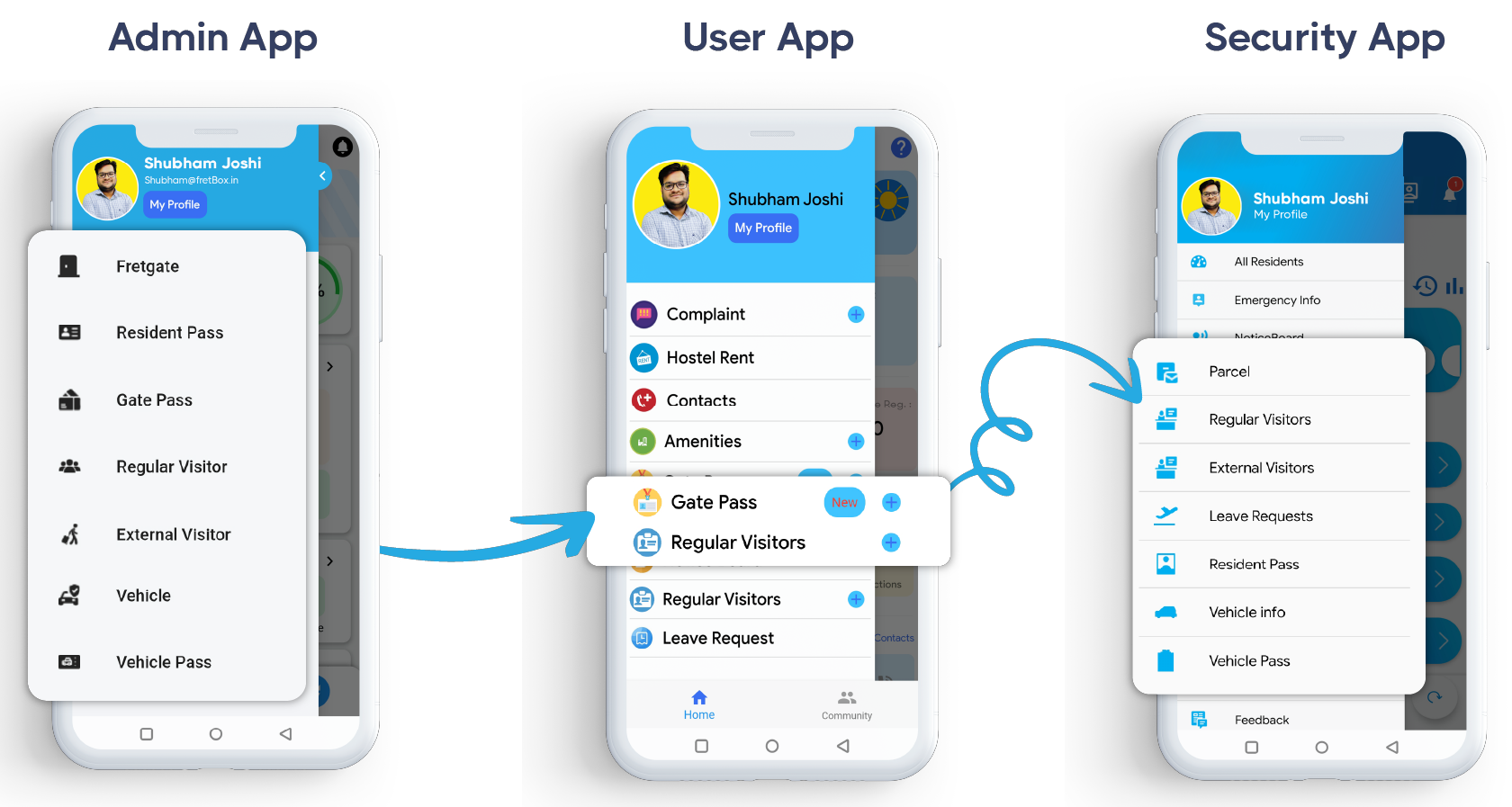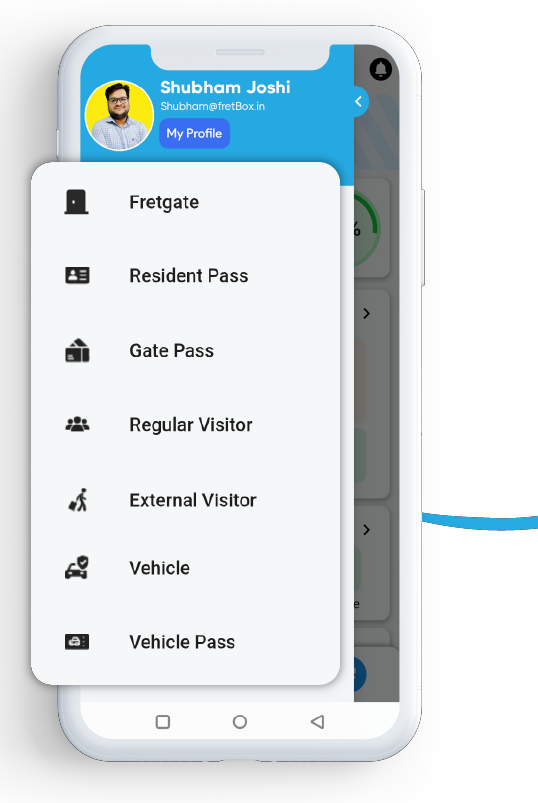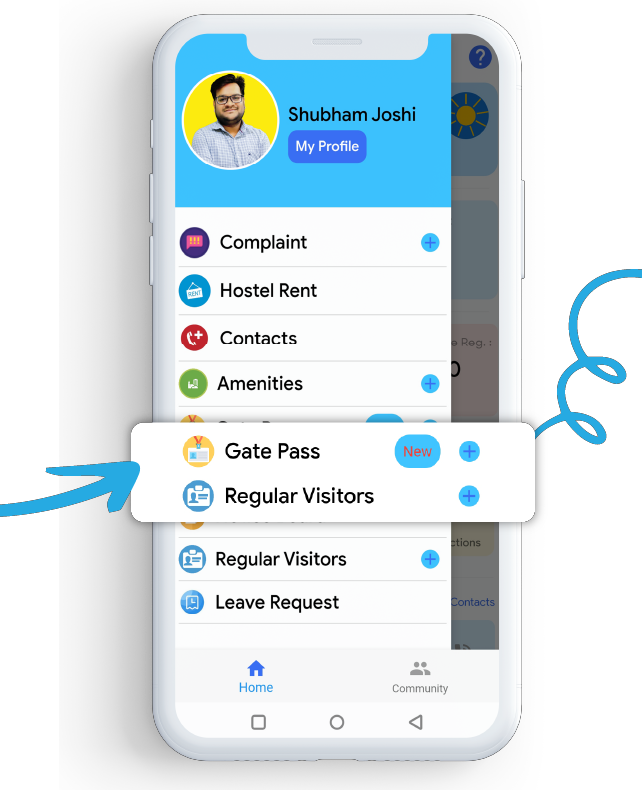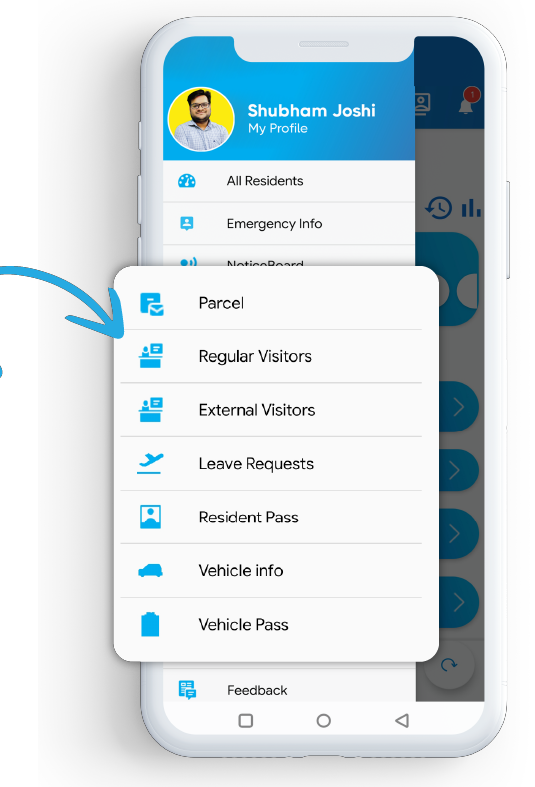Hostel Security System.
Fretbox enables real-time tracking of hostel operational activities. It listens to every resident's touchpoint & improves their comfort, security. Enhance overall functioning of your hostel through Fretbox.

All 3 Apps Security Features
FretBox helps enhance the overall functioning / productivity & provide residents feedback.

Monitor and manage multiple hostels via web & mobile applications 24*7
Monitor night patrolling of security
Get Real Time status of Student in/out
Get alerts for overstayed visitors.
Daily alerts of outside residents (Hostels).
Hostel Student Security System FAQs
Hostels usually have several security measures in place to protect their students, some of which include:
Access control: Hostels typically have controlled access through gates, doors, or turnstiles, and require students to use a keycard or enter a code to enter. This ensures that only authorized individuals can enter the hostel premises.
CCTV cameras: Hostels often have CCTV cameras installed in common areas, corridors, and outside entrances to monitor who enters and exits the hostel, and to deter any potential criminals from committing crimes.
Security guards: Some hostels may have security personnel stationed at the entrance or patrolling the premises to ensure that only authorized individuals are allowed inside and to deal with any incidents that may occur.
Room locks: Hostel rooms are usually equipped with secure locks to prevent unauthorized entry, and it is recommended that students keep their room doors locked at all times.
Emergency protocols: Hostels typically have emergency protocols in place, such as fire safety measures and evacuation plans, to ensure the safety of students in case of an emergency.
Regular safety checks: Hostel staff may conduct regular safety checks to identify and address any potential safety hazards, such as faulty wiring or broken locks.
It's important for hostel students to be aware of these security measures and to follow any safety guidelines provided by the hostel management to ensure their own safety and the safety of their peers.
Hostel students' safety is usually monitored by a combination of measures, including:
Resident Assistants: Hostels usually have resident assistants (RAs) who are responsible for monitoring students' behavior, addressing any issues or concerns, and reporting any incidents or violations to the hostel management.
CCTV cameras: As mentioned earlier, CCTV cameras are often installed in common areas, corridors, and outside entrances to monitor who enters and exits the hostel, and to deter any potential criminal activity.
Regular inspections: Hostel staff may conduct regular inspections to ensure that students are complying with hostel rules and regulations, and to identify any potential safety hazards or security breaches.
Reporting systems: Hostels may have anonymous reporting systems in place that allow students to report any concerns or incidents without fear of reprisal.
Student feedback: Hostel management may seek feedback from students about their experiences and any concerns they may have to identify areas for improvement and ensure that students feel safe and supported.
It's important for hostel students to also take responsibility for their own safety by following hostel rules and guidelines, reporting any concerns or incidents, and being aware of their surroundings.
The procedures for reporting any security concerns in hostels may vary depending on the specific hostel, but some common steps include:
Inform hostel staff: If a student has a security concern, they should inform hostel staff as soon as possible. This could be the front desk staff, resident assistants, or security personnel. The staff can then investigate the issue and take appropriate action.
Use anonymous reporting systems: Some hostels have anonymous reporting systems in place that allow students to report concerns or incidents without fear of reprisal. These systems may involve a hotline, a suggestion box, or an online form.
Contact emergency services: In case of an emergency, such as a fire or medical emergency, students should contact emergency services immediately by calling the local emergency number.
Inform authorities: If a student has been the victim of a crime or witnessed a crime, they should inform the local authorities. Hostel staff can assist with this process by providing information and contacting the authorities on the student's behalf if necessary.
It's important for hostel students to be aware of the reporting procedures and to report any security concerns promptly to ensure the safety of themselves and their peers.
There are several security systems that can be in place to ensure the safety of hostel students. Some of these security systems include:
Access Control: Hostels can have access control systems in place such as security gates, turnstiles, or access cards that allow only authorized individuals to enter the premises.
CCTV Cameras: Hostels can install CCTV cameras in common areas, hallways, entrances and exits to monitor activity, and help identify any suspicious behavior.
Alarms: Hostels can install alarms that will go off in case of an emergency such as a fire, or break-in.
Security Personnel: Hostels can have trained security personnel who patrol the premises or are stationed at the entrance to prevent unauthorized access and ensure the safety of students.
Fire Safety Systems: Hostels can install fire safety systems such as fire alarms, smoke detectors, fire extinguishers, and sprinkler systems to prevent, detect, and contain fires.
Student Education: Hostels can educate students about the importance of personal safety and security, including how to secure their belongings and how to report any suspicious activity.
It is important for hostels to have a comprehensive security plan in place to ensure the safety of their students. Hostel staff should regularly review and update their security systems to ensure that they are effective and up-to-date with the latest security technologies and practices.
Yes, there are usually rules and regulations that hostel students must follow when it comes to security. These rules and regulations are in place to ensure the safety and well-being of all students and staff members.
Some common security rules and regulations that hostel students may be required to follow include:
Keeping their doors locked: Hostel students are typically required to keep their room doors locked at all times, even when they are inside their rooms.
Not allowing unauthorized persons inside the hostel: Hostel students may be prohibited from allowing unauthorized persons, including non-residents, inside the hostel.
Reporting any suspicious activity: Hostel students are often required to report any suspicious activity to the hostel staff or security personnel immediately.
Complying with hostel rules and regulations: Hostel students are expected to comply with all hostel rules and regulations, including those related to security.
Fire safety: Hostel students are usually required to comply with fire safety regulations, such as not smoking inside the hostel, not blocking fire exits, and not tampering with fire safety equipment.
Evacuation procedures: Hostel students may be required to participate in evacuation drills and comply with evacuation procedures in case of an emergency.
It's important for hostel students to understand and comply with all rules and regulations related to security to ensure the safety of themselves and their fellow students.
Yes, most hostels have an emergency response plan in place to ensure the safety and well-being of their students in the event of an emergency. The emergency response plan may include the following:
Emergency contact information: Hostel students are typically provided with a list of emergency contacts, including the local police, ambulance, and fire department. This information may be posted in common areas, such as the front desk or notice board.
Evacuation procedures: Hostel students may be provided with instructions on evacuation procedures in case of an emergency, including the location of emergency exits, assembly points, and emergency equipment.
Communication plan: The hostel may have a communication plan in place to keep students and staff members informed during an emergency. This could include using loudspeakers, text messages, or social media to communicate with students.
First aid and medical assistance: Hostels may have first aid kits and trained personnel on-site to provide medical assistance if necessary. In case of a more serious medical emergency, the hostel staff may call an ambulance or take the student to a nearby hospital.
Alternative accommodation: In the event that the hostel is no longer safe or habitable, alternative accommodation may be provided for students.
It's important for hostel students to familiarize themselves with the emergency response plan and follow the instructions provided by the hostel staff in case of an emergency.
The consequences for breaking security rules in a hostel may vary depending on the severity of the offense and the rules and regulations set forth by the hostel management. However, breaking security rules can result in serious consequences, such as:
Warning: Students who break security rules may receive a verbal or written warning from the hostel staff or management.
Fine: Hostel students may be fined for breaking security rules. The fine amount may vary depending on the severity of the offense.
Suspension: In more serious cases, hostel students may be suspended from the hostel for a period of time. During this time, they will not be allowed to stay in the hostel.
Expulsion: In extreme cases, students may be expelled from the hostel, and their accommodation contract may be terminated.
Legal action: In cases where a student's behavior is illegal or poses a serious threat to the safety of other students, legal action may be taken against them.
It's important for hostel students to understand the seriousness of breaking security rules and the potential consequences they may face. By following the rules and regulations set forth by the hostel management, students can ensure their own safety and the safety of their fellow students.
The frequency of security system testing and updating can vary depending on the hostel's policies and regulations, as well as the type of security systems in place. However, it's common for hostels to have regular security system checks and updates to ensure that they are functioning properly and providing adequate protection.
Some common security system tests and updates that hostels may conduct include:
Security audits: Regular security audits may be conducted by internal or external security experts to assess the effectiveness of the security systems in place and identify any vulnerabilities that need to be addressed.
Software updates: Hostels may conduct regular software updates on their security systems, including fire alarms, intrusion detection systems, and surveillance cameras, to ensure that they are running on the latest version and are less vulnerable to cyber threats.
Testing emergency procedures: Hostels may conduct regular drills to test emergency procedures and ensure that they are working effectively. This can include fire drills, earthquake drills, and other emergency response procedures.
Physical security checks: Hostels may conduct regular physical security checks, such as checking the locks on doors and windows, to ensure that they are in good working condition.
Training staff: Hostel staff may receive regular training on security procedures and protocols to ensure that they are up to date with the latest security measures and know how to respond in case of an emergency.
Overall, the goal of testing and updating security systems is to ensure that they are functioning properly and providing the best possible protection for hostel students and staff members.
Yes, many hostels have special measures in place to protect students from external threats. Some of the measures include:
Controlled access: Hostels may have controlled access systems in place to limit entry to only authorized individuals, such as students, staff, and guests. This can include key card or biometric access systems, as well as security guards at entrances.
Surveillance cameras: Hostels may have surveillance cameras installed in common areas, such as hallways, entrances, and common rooms, to monitor activities and detect any suspicious behavior.
Security guards: Some hostels may have security guards stationed at entrances and other high-traffic areas to deter and respond to external threats.
Emergency response plan: Hostels may have an emergency response plan in place to respond to external threats, such as natural disasters or terrorist attacks.
Location-specific measures: Hostels located in areas with high crime rates or geopolitical instability may take additional security measures to protect students. This can include hiring additional security staff, conducting more frequent security checks, or providing security escorts for students.
Overall, hostels take the safety and security of their students seriously and may implement a range of measures to protect them from external threats. Students should familiarize themselves with the security measures in place and follow any safety guidelines provided by the hostel management.
Yes, hostel students are typically allowed to keep valuables and personal items in their rooms. However, it's important to keep in mind that hostels are public places, and there is always a risk of theft or loss.
To minimize the risk of theft or loss, hostels may provide students with lockers or safes to store their valuables. Students may also be advised to keep their doors locked when they are not in their rooms and to not leave valuables out in the open.
It's important for students to take responsibility for their personal belongings and take precautions to keep them safe. This may include not bringing valuable or irreplaceable items to the hostel or taking out insurance to cover the cost of any loss or damage.
Hostels may also have policies in place regarding the storage of certain items, such as weapons, drugs, or illegal substances. Students should familiarize themselves with these policies and abide by them to avoid any potential consequences.
Overall, students should exercise caution when it comes to storing valuables or personal items in their rooms and take steps to minimize the risk of theft or loss.


